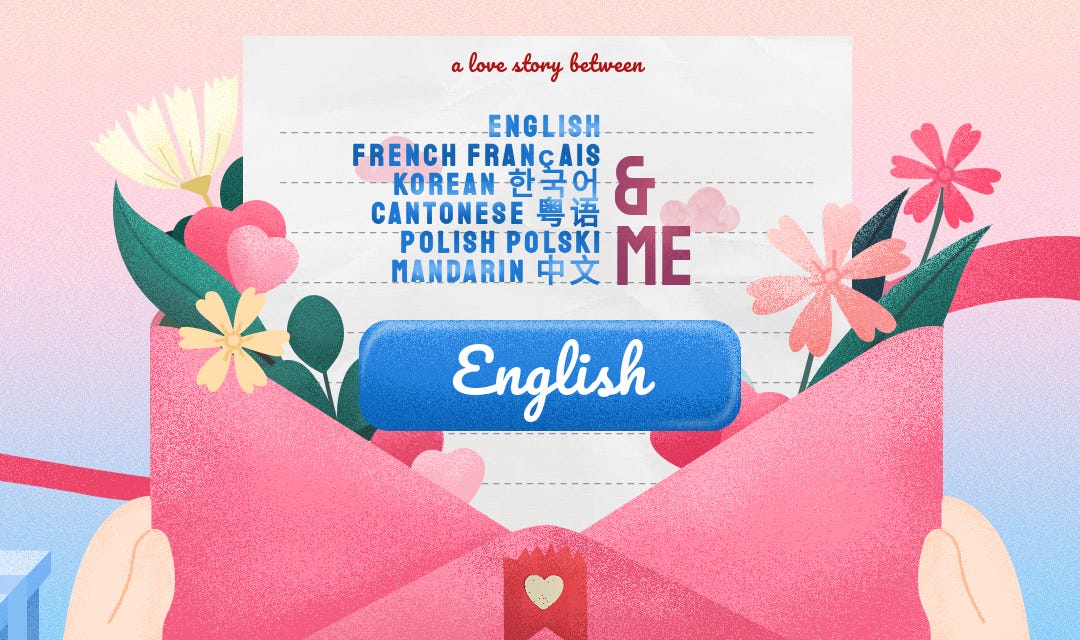ps. you can listen to this post by playing the audio above!Hello Friends!
I’m Fionna, a product manager, YouTuber and late-night FM DJ.
Every Sunday I share a story on what inspires me to be creative and musings that week. I’m fascinated by design, technology, people, languages, and the idea that I can use them to reinvent myself.
You will find that I express myself through different languages, witty mEmeS and impeccable formatting. Intrigued? Want more content like this in your inbox?
Let this be our creative outlet.
Twitter | YouTube | Instagram | LinkedIn | Newsletter | Spotify | Buy me a 🍍
I'm bilingual in Mandarin and English. As a hobby, I took French and Korean in high school and I'm still trying to keep them up in 2021. Through friends and travel, I also dabbled in learning Cantonese and Polish.
In this series, I will unwind the "love letters" between me and these languages - what serendipitous encounters that started it all, the ups and downs, and where we are now.
Cheesiness (+🤮) aside, let's get started with English.
🇨🇦
🇺🇸
🇬🇧
English| French Français | Korean 한국어 | Cantonese 粤语 | Polish Polski | Mandarin 中文
Learning English in Mandarin
My mother tongue is Mandarin as I lived in China for 10 years before moving to Canada. My elementary school started teaching English weekly in Grade 3. I remember the textbook was in Chinese but our teacher, Miss He, instructed us to only speak English in class. She was one of the best teachers I had. I enjoyed her classes so much that I volunteered to be the class rep where I collected homework and read textbooks out loud (🤓).
That was a great introduction to English and I was hooked. However, the school system prioritized Math and Sciences. Right before exams, my favorite English (and Phys Ed.) classes would get replaced by "more important" classes. We would have our English textbooks out, as the bell rang, the Math teacher would walk in and tell us that we need this time to prep for the Math exam (true story, comment 😢 if it happened to you too!).
Needless to say, English was not highly regarded by schools back then. Being a mandatory class instead of an elective, many students just wanted a pass. You can probably relate if you had to take French or Spanish in school 🙋♀️🙋♂️🙋.
Learning English in English
After 4 years of English "education", one 15-hour-plane-ride later, I found myself immersed in an environment where English is needed for survival and I couldn't even ask for directions.
Good thing that Canada has an "English as a Second Language (ESL)" program where newcomers are offered English classes for free. For students, I also had a version of that but at the sacrifice of taking regular English classes.
Anecdote: I was terrible at English but absolutely SMASHED Math, as you probably guessed. My entire class was astonished to see me ace the quiz so fast. What can I say, It was third grade Math to me at most 🤷♀️ #edupriorities
I graduated ESL in middle school and finally started taking English with my class. We read literary classics, wrote essays and presented our views. At that point, my listening was pretty good, but writing and speaking were still lacking. What helped me the most was going out and talking to people. I never liked that "ESL" label and how people treated me differently at school. Instead, I went out to community centers, libraries and volunteer hubs where I discovered hobbies that would accompany me years later.
After school, I would go to multiple community centers on my kiddy scooter, taking classes in dance, swimming, skateboarding, website design, basketball, and even creative writing. Everything that seemed fun and new. The people there didn't see me as an "ESL" student but just another gal who wants to have a good time. I was relaxed and got more comfortable expressing myself.
Learning English through Student Clubs
Whenever I think about high school, I still couldn't believe that I, who couldn't speak a few years ago, stood in front of the microphone and read morning announcements to the whole school.
During the audition, I remember my body trembling so hard and couldn’t even hold the script still. After I was done, I couldn't look at anyone in the eye because I was convinced that I absolutely bombed it. Bless their hearts, they welcomed me to the Announcements Team! Looking back, I think that’s when everything changed. This external validation shut down the doubts in my head. It didn’t matter how much I reassured myself that “Yes, Fionna, you have no trouble speaking English”. But now it’s a fact that people can understand me through announcements”. This also planted the seed for me going into radio later on.
With the seniors' help, I learned to speak with a big smile and a modulated tone so that my voice comes out friendlier through the speakers. Things that I never would've known if I didn't show up.
Another game changer was speaking to lead.
I started a dance club to perform at various events and led the "Free the Children: Me to We” club to fundraise and raise awareness. Both required me to recruit, facilitate meetings and resolve conflicts. Every day presented a different challenge, a scenario that I've never been in, and had to use words to carry the team or project forward.
For dance, I had to teach the choreography in a way that members can understand and follow. With performances, I had to negotiate costume prices with vendors and collaborate with the stage crew on lighting design. These were experiences that I didn't know I had signed up for, but they taught me to use English in a different light.
The scariest was delivering a speech to recruit for the "Me to We" club during school assemblies. Hundreds of students and staff sat in the audience with a spotlight on me. I revised my speech over and over again trying to sound persuasive, empathetic and inspiring. At that point, I think the mission and responsibility of contributing to a philanthropic cause completely changed my relationship with English. It had power. Beyond announcements on where clubs meetings are held, or which direction a dancer should spin. English can move you, excite you, influence you, and unite us to make a difference. In the world of “Me to We”, that’s one more school built in Kenya.
Luckily I had a group of awesome friends, native speakers or not, who supported me and gave me space to learn and grow. It’s a cringe-fest whenever I watch these videos, but no regrets.
Learning English through Engineering
Recess is over, college wants no fluff, prove everything using the first principle.
Praxis. Request-For-Proposals (RFPs). Lab reports. Presentations. Research papers. Thesis.
If anyone told you that engineering only requires math skills and not English, they are wrong. Communication is king in any discipline. Even if you use symbols in your proof, you still need to know what they mean and when to use it.
E.g.
All writers on Substack are amazing.
Fionna is a writer on Substack.
∴ Fionna is amazing.Q.E.D.
In every lab, and every class had a lab 😭. Performing the experiment is only 20% of the work. Writing the introduction, theory, method, results & discussion, and conclusion are the other 80%. How you “twist” your conclusion if results didn’t match the hypothesis gives you the extra 10%. #tooreal
By the end of college, I think I had 100x more .doc or .ppt files than .matlab. The amount of writing and presentations I had to do was insane, and they weren't anything like what I learned before. No one taught us how to write a response to a RFP or defend a thesis, so we all had to learn this cold, logical and meticulously numerated "Engineering English" wrapped up in a table of contents as we pulled all-nighters in the common room. #goodtimes #butnomoreplz
Needless to say, Engineering English is pragmatic. It’s used to describe a proposal, //comment on what this gibberish code printlns, record results in significant figures, legalize an agreement and direct people out of dangerous situations. It’s cold, dry and feels distant. There's no room for hand-wavy stuff and very little room for imagination. Yet through these seemingly emotionless words, we’re able to innovate and send people to outer space.
Learning English through Product Management
If the RFPs I wrote in college were theoretical, then the RFPs I write as a PM are the real deal. We call them "specs".
I got into product management by chance. I wrote biomedical research papers but nothing related to software. Engineering taught me critical thinking and the different perspectives needed to solve a problem. So the idea of RFPs weren't novel, but it still took me some time to write English in yet another way.
PMs are natural communicators, or that's how we want you to think. Because it's literally our job to talk to everyone and make sure we're "aligned". #PMJargon
How we write specs will directly impact the product, and we must think from the perspective of a user. It's no wonder that a typical requirement starts with, "As a user, I want X so that I can do Y". If you are a good PM, you also need to combine English words with Arabic numerals to define OKRs and KPIs. Taking this newsletter as an example:
Objective – successfully launch a weekly email newsletter
Key Results
Viewed by 300+ people per post
Gain 5 new subscribers every week
Get shared on 5 different platforms
Collect feedback from 10% of the readers
It goes without saying, after 4 years of being a PM, my understanding and use of English has evolved yet again. It's a tool I use to facilitate scrums, a voice to advocate for the users, a torch to lead the team, and a plea for you to share my newsletter 😉 #smooth
What's next with English?
Language is both a science and an art, and I want to uncover its many forms.
When used for business, which is my main use today, I want to level up the art of "PM Speak" in slightly uncomfortable situations.
There was one hostile conversation I was in where one side refused to step down and come to a consensus. While people were speaking over each other to get their points across, this person came in speaking in the most soothing yet firm voice possible and brought everyone to a halt. As if a blue butterfly flew in a flea market and everyone dropped what they were doing to stare at this magnificent creature. He repeated a few things and asked some clarifying questions. While the other side was still furious, he noticeably slowed down the pace of the exchange. For the first time, I felt like both sides were having a productive conversation.
It was impressive what he did to turn around a meeting like that, and I think that's the power of language paired with the right tone, technique and a hint of bravery.
There’s also the creative side of me that has various ideas sprouting in my head waiting to be unleashed. I want to experiment with different forms and styles of writing while marinating these ideas so they are well articulated once shared with you.
Also, I don't mind picking up a British or Aussie or New Z accent to spice things up 😉
Next up in the series I’ll write about French. If you’d like to read more, please subscribe and share it with a friend! On se revoit la semaine prochaine~
What’s coming to your inbox
The more languages you know, the easier it is to learn another?
TikTok vs. DouYin: Twins or Siblings?
Where to find me
👩💻 Twitter: @fionnagan
👩🍳 YouTube: Fionna Gan
👩🎤 Instagram: @fionna.gan
👩🎓 LinkedIn: Fionna Gan
🤹♀️ Newsletter: The Creative Outlet
👩🚀 Voice: The Creatieve Outlet























💌 A Love Story Between Languages and Me - Part 1